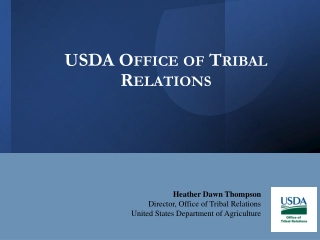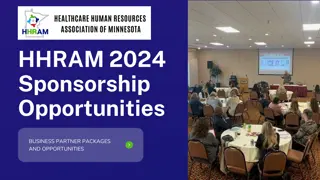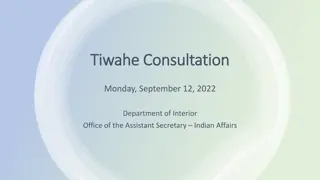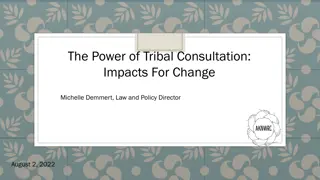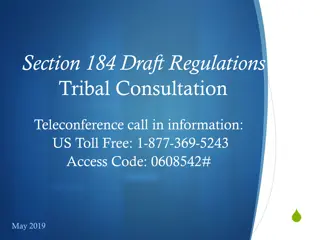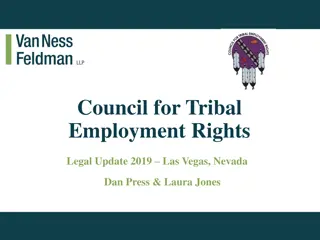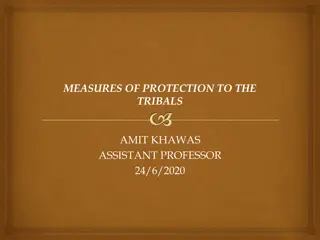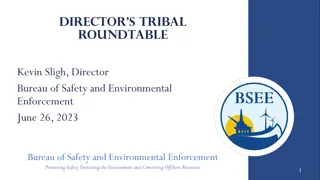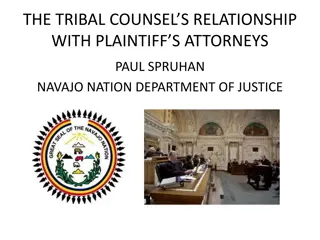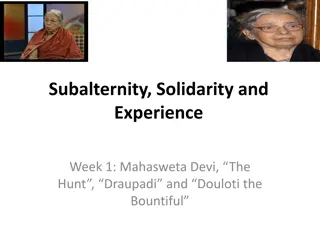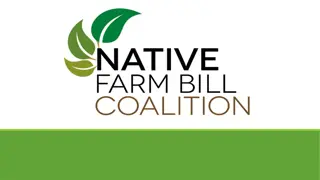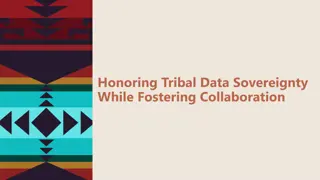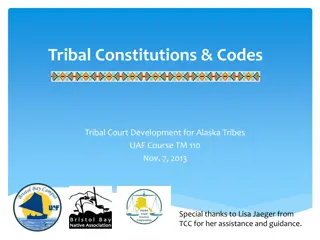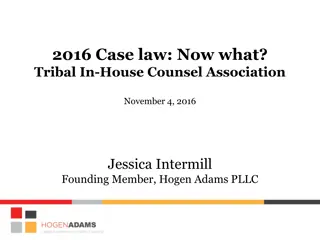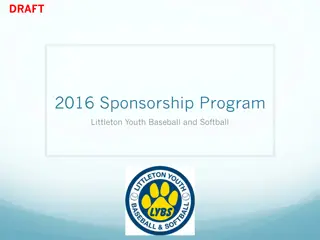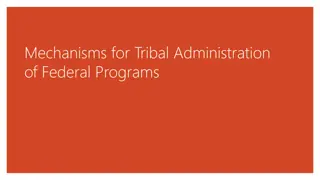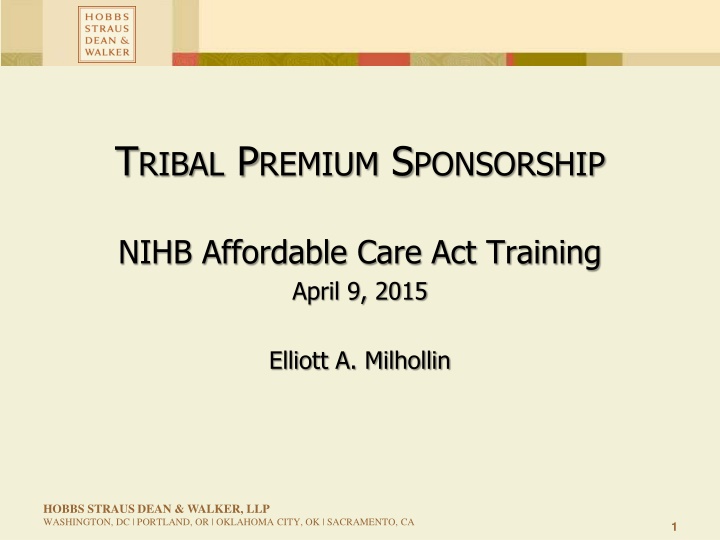
Key Points on Tribal Premium Sponsorship & Affordable Care Act Training
Gain insights on Tribal Premium Sponsorship, the Affordable Care Act, individual mandates, and health insurance marketplaces. Learn about the Indian Health Care Improvement Act, Medicaid expansion, and employer obligations. Understand the Health Insurance Marketplace, subsidies, and the individual mandate requirements. Discover how to comply with healthcare regulations and ensure coverage for all individuals.
Download Presentation

Please find below an Image/Link to download the presentation.
The content on the website is provided AS IS for your information and personal use only. It may not be sold, licensed, or shared on other websites without obtaining consent from the author. If you encounter any issues during the download, it is possible that the publisher has removed the file from their server.
You are allowed to download the files provided on this website for personal or commercial use, subject to the condition that they are used lawfully. All files are the property of their respective owners.
The content on the website is provided AS IS for your information and personal use only. It may not be sold, licensed, or shared on other websites without obtaining consent from the author.
E N D
Presentation Transcript
TRIBAL PREMIUM SPONSORSHIP NIHB Affordable Care Act Training April 9, 2015 Elliott A. Milhollin HOBBS STRAUS DEAN & WALKER, LLP WASHINGTON, DC | PORTLAND, OR | OKLAHOMA CITY, OK | SACRAMENTO, CA 1
THE PATIENT PROTECTION AND AFFORDABLE CARE ACT Enacted March 23, 2010, P.L. 111-148 Improves the Indian Health Care Improvement Act Reforms Health Insurance Authorizes States to Expand Medicaid Creates New Health Insurance Exchange Marketplaces Creates obligations on Employers HOBBS STRAUS DEAN & WALKER, LLP WASHINGTON, DC | PORTLAND, OR | OKLAHOMA CITY, OK | SACRAMENTO, CA 2
The Individual Mandate The ACA requires everyone to obtain minimum essential health coverage (Medicare, Medicaid, VA, TriCare, Employer or private insurance) or pay a tax penalty the Individual Mandate Members of Indian Tribes and IHS beneficiaries who are not tribal members can claim a hardship exemption using IRS Form 8965 when they file their taxes HOBBS STRAUS DEAN & WALKER, LLP WASHINGTON, DC | PORTLAND, OR | OKLAHOMA CITY, OK | SACRAMENTO, CA 3
HEALTH INSURANCE MARKETPLACE OVERVIEW ACA creates Health Insurance Marketplaces to allow individuals to comply with the individual mandate. The federal government provides significant subsidies for lower income people to buy insurance on a sliding scale from 100% to 400% of the Federal Poverty Level (FPL). State or Federal? Run by State governments or State non-profits States have the option not to create Exchanges, in which case the federal government will operate an exchange for the residents of the state. King v. Burwell availability of subsidies in FFM under review HOBBS STRAUS DEAN & WALKER, LLP WASHINGTON, DC | PORTLAND, OR | OKLAHOMA CITY, OK | SACRAMENTO, CA 4
WHAT IS THE HEALTH INSURANCE MARKETPLACE? Website and forum where consumers can compare health insurance plans with different levels of benefits and premiums, and purchase insurance. Health insurance plans must provide certain information and a minimum level of benefits in order to participate in an Marketplace as a Qualified Health Plan (QHP). Qualified Health Plans in the Federally-Facilitated Marketplace must offer to contract with Indian health providers in their coverage area using the Indian Addendum. HOBBS STRAUS DEAN & WALKER, LLP WASHINGTON, DC | PORTLAND, OR | OKLAHOMA CITY, OK | SACRAMENTO, CA 5
WHY SHOULD TRIBES CARE ABOUT A FEDERAL HEALTH INSURANCE PROGRAM? An estimated $350 Billion in new federal health care spending will be made available through health insurance subsidies and cost-sharing exemptions offered through the Marketplaces. To access these funds, individuals must purchase insurance on the Health Insurance Marketplaces. Tribal health programs could significantly increase their third party revenue collections if the individuals they serve enroll in Marketplace coverage. HOBBS STRAUS DEAN & WALKER, LLP WASHINGTON, DC | PORTLAND, OR | OKLAHOMA CITY, OK | SACRAMENTO, CA 6
PREMIUM ASSISTANCE MODEL Nationally, HHS reports that over 16 million people have enrolled in the new Health Insurance Exchanges Only 28,000 identify as American Indian or Alaska Native Barriers to enrollment include lack of familiarity with the subsidies and cost sharing exemptions for Indians, lack of familiarity with insurance, and having to pay premiums. Tribes may overcome these barriers through Premium Assistance programs where they pay for the unsubsidized portion of the premium for their members, obtaining coverage at a fraction of the cost. HOBBS STRAUS DEAN & WALKER, LLP WASHINGTON, DC | PORTLAND, OR | OKLAHOMA CITY, OK | SACRAMENTO, CA 7
AUTHORITY FOR PREMIUM ASSISTANCE Section 402 of the IHCIA allows Tribal and urban Indian health programs to use their federal health care dollars to purchase insurance for their beneficiaries. Federal regulations provide that Qualified Health Plans in both the federal and State marketplaces must accept premium payments from Tribes, Tribal Organizations and Urban Indian programs on behalf of their beneficiaries. 45 C.F.R. 156.1250(b). Federal regulations also provide that Qualified Health Plans may accept aggregated payment of premiums 45 C.F.R. 155.420(b). HOBBS STRAUS DEAN & WALKER, LLP WASHINGTON, DC | PORTLAND, OR | OKLAHOMA CITY, OK | SACRAMENTO, CA 8
MAJOR BENEFITS TO AMERICAN INDIANS AND ALASKA NATIVES IN THE EXCHANGES There are two sets of benefits available to American Indians and Alaska Natives in the Exchanges. Income-based benefits. IHS is not considered minimum essential coverage for purposes of qualifying for the federal premium assistance subsidies. As a result, American Indians and Alaska Natives can qualify for the subsidies if they meet the income criteria. Special cost-sharing exemptions for American Indians and Alaska Natives allow them to take advantage of the lowest cost plans on the Exchanges. HOBBS STRAUS DEAN & WALKER, LLP WASHINGTON, DC | PORTLAND, OR | OKLAHOMA CITY, OK | SACRAMENTO, CA 9
WHO IS ELIGIBLE FOR A SUBSIDY? 2015 Federal Poverty Guidelines Lower 48 States % of FPL 100% 138% 200% 300% 400% 1-person $11,770 $16,242 $23,500 $35,310 $47,080 2-person $15,930 $21,983 $31,860 $47,790 $63,720 4-people $24,250 $33,465 $48,500 $72,750 $97,000 HOBBS STRAUS DEAN & WALKER, LLP WASHINGTON, DC | PORTLAND, OR | OKLAHOMA CITY, OK | SACRAMENTO, CA 10
SPECIAL RULESFOR AI/AN ONTHE EXCHANGES No Cost-Sharing for Indians with incomes up to 300% FPL no matter where they receive services (Zero Cost- Sharing Plan). Indians with incomes over 300 percent FPL will have no cost sharing when they receive services from an IHS or Tribal provider or through a CHS referral (Limited Cost Sharing Plan). 300% FPL for family of 4: $72,750 Cost-sharing includes all co-pays and deductibles. Month to month enrollment allowed HOBBS STRAUS DEAN & WALKER, LLP WASHINGTON, DC | PORTLAND, OR | OKLAHOMA CITY, OK | SACRAMENTO, CA 11
OPPORTUNITIESFOR TRIBAL HEALTH PROGRAMS A Tribe may elect to purchase insurance for IHS beneficiaries who do not have another form of insurance. Many Indians are eligible for the low-income subsidies that are available only through Marketplaces Tribe may elect to pay all or part of the unsubsidized part of the premium for its beneficiaries. No tax penalty to beneficiary. Coverage will provide new revenue for Indian Health Programs Allow billing of insurance for the Indian Health Program services Reduce Contract Health Services expenditures by allowing billing of insurance plans for services supplied by CHS providers HOBBS STRAUS DEAN & WALKER, LLP WASHINGTON, DC | PORTLAND, OR | OKLAHOMA CITY, OK | SACRAMENTO, CA 12
HOW MUCH DOES INSURANCE COSTFOR THOSE ELIGIBLEFOR FEDERAL SUBSIDIES? Income Level Premium as a Percent of Income Up to 133% FPL 2% of income 133 - 150% FPL 3 4% of income 150 200% FPL 4 6.3% of income 200 250% FPL 6.3 8.05% of income 250 300% FPL 8.05 9.5% of income 300 400% FPL 9.5% of income Source: Kaiser Family Foundation Focus on Health Reform, July 2012, available at www.kff.org/healthreform/upload/7962-02.pdf HOBBS STRAUS DEAN & WALKER, LLP WASHINGTON, DC | PORTLAND, OR | OKLAHOMA CITY, OK | SACRAMENTO, CA 13
Considerations in Designing a Premium Assistance Plan Assess population with potential to access Exchange plan insurance How many uninsured beneficiaries do you have? How many uninsured beneficiaries would qualify for premium subsidies and/or cost sharing exemptions? Determine whether the Tribe would be willing to pay the unsubsidized portion of plan premiums for some of all of its uninsured IHS beneficiaries Tribe may use financial need as an eligibility criteria, but is not required to. Tribe may set other eligibility criteria. Bronze plans have the lowest premiums but the highest cost-sharing. Because AI/ANs are exempt from cost-sharing, the bronze plans may offer significantly lower cost coverage for AI/ANs but offer the same benefits. HOBBS STRAUS DEAN & WALKER, LLP WASHINGTON, DC | PORTLAND, OR | OKLAHOMA CITY, OK | SACRAMENTO, CA 14
TRIBAL MEMBER EMPLOYEE CONSIDERATIONS The employer mandate requires Tribal governments to offer coverage to members who are employed by the Tribe because they are employees. An offer of qualifying employer coverage by a Tribe to a tribal member will disqualify the tribal member from taking advantage of the subsidies on the Exchange. Care must be taken in designing a premium assistance program with regard to tribal member employees. HOBBS STRAUS DEAN & WALKER, LLP WASHINGTON, DC | PORTLAND, OR | OKLAHOMA CITY, OK | SACRAMENTO, CA 15
CONSIDERATIONSIN IMPLEMENTINGA PLAN A CHS referral will be required in order to ensure there is no cost-sharing for an individual in a limited cost-sharing plan. A referral is not necessarily a CHS authorization. Plans have their own referral requirements. Patients who see providers who are out of the plan s network may be liable for any uncovered charges if they do not have a valid CHS authorization for payment. HOBBS STRAUS DEAN & WALKER, LLP WASHINGTON, DC | PORTLAND, OR | OKLAHOMA CITY, OK | SACRAMENTO, CA 16
Questions? Elliott Milhollin Hobbs, Straus, Dean & Walker LLP 2120 L Street, NW Washington, D.C. 20037 (202) 822-8282 emilhollin@hobbsstraus.com HOBBS STRAUS DEAN & WALKER, LLP WASHINGTON, DC | PORTLAND, OR | OKLAHOMA CITY, OK | SACRAMENTO, CA 17

